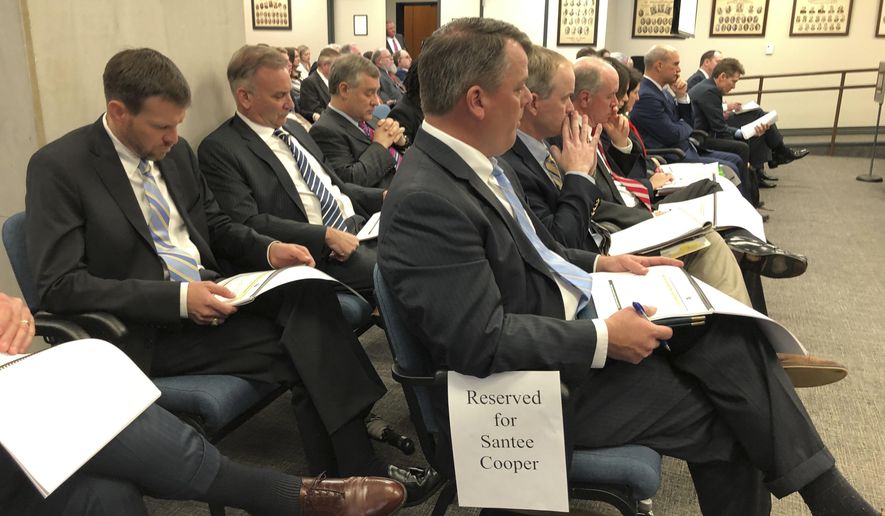COLUMBIA, S.C. (AP) - On the advice of their lawyers, four current and former executives from South Carolina’s state-owned utility did not attend a Senate meeting Tuesday discussing whether to sell the business, Santee Cooper’s new CEO said.
Senators then warned the utility that if they didn’t show up Wednesday, subpoenas would be issued. Other Santee Cooper leaders promised they would show up.
It was a stark reminder that as lawmakers consider whether to sell Santee Cooper, plenty of other problems - including potential criminal charges - remain unresolved in South Carolina’s nuclear debacle.
And two weeks of hearings by the House and Senate over whether to trust Santee Cooper to reform itself, sell it to NextEra Energy of Florida or have Dominion Energy of Virginia manage it have revealed there aren’t any easy answers for what could be a $9.5 billion question.
Senate Finance Committee Chairman Hugh Leatherman opened his committee’s Tuesday meeting by mentioning several Santee Cooper employees he wanted to testify under oath.
Those include Michael Crosby, senior vice president of nuclear energy, and Marion Cherry, the utility’s on-site manager when the construction of two nuclear reactors that Santee Cooper held a minority share in fell apart after the utility spent $4 billion. Both remain with the company.
Santee Cooper CEO Mark Bonsall said both men were told not to testify to protect their constitutional rights. Criminal investigations into Santee Cooper and its private partner in the failed nuclear project, SCANA Corp., continue. Dominion Energy bought SCANA last year.
Leatherman, a Florence Republican, also wanted to hear from former Santee Cooper CEO Lonnie Carter and former board chairman Leighton Lord, who refused to testify. Santee Cooper is paying for lawyers for all of the men.
The Tuesday meeting was the Senate Finance Committee’s fourth as it faces a mid-March deadline to send its recommendation on Santee Cooper to the full Senate.
On Wednesday, the House budget panel hears from Dominion. The Senate committee heard from Dominion last week. The Virginia company has faced few questions and released the fewest details about its plan.
At the same time the Senate committee met Tuesday, the House Ways and Means Committee was talking just across Statehouse grounds. The House’s budget committee, which also faces a mid-March deadline, heard from NextEra CEO Jim Robo about his company’s $9.5 billion offer to buy Santee Cooper. NextEra would pay off the $4 billion debt from the never-built nuclear plants, providing $541 million to settle a lawsuit over increased rates because of the nuclear debacle and a promise to lock in rates for four years.
When the state Department of Administration chose the three bids as the best offers earlier this month, the ratepayer lawsuit against Santee Cooper was unresolved, making NextEra’s offer to settle the case quite attractive.
But Santee Cooper executives confirmed Tuesday that they have their own $520 million settlement on the table, pending approval by the utility’s board and the board of the state electric cooperatives whose 2 million customers buy most of Santee Cooper’s power.
Santee Cooper’s electric rates would be frozen for four years. Santee Cooper is paying $200 million, while Dominion pays the remaining $320 million. Lawyer’s fees for what has commonly been referred to as the Cook case would be capped at $78 million, Santee Cooper attorney Mike Baxley said.
“If we lost the Cook case, that could have been the end of Santee Cooper,” Baxley said.
The details of the settlement were first reported by anonymous sources to The Post and Courier of Charleston last week.
For senators, that settlement just presented more questions, like whether it changes Santee Cooper’s proposed rates, which were 1% lower than NextEra’s offer over 20 years when the bids were made.
“I don’t think the resolution to that lawsuit ends this process,” said Senate Majority Leader Shane Massey, who has not made up his mind on which bid to accept. “As big of a claim as that was, you would think the resolution of it is going to have an impact.”
Both the House and Senate committees have more meetings scheduled over the next few weeks.
___
Follow Jeffrey Collins on Twitter at https://twitter.com/JSCollinsAP




Please read our comment policy before commenting.